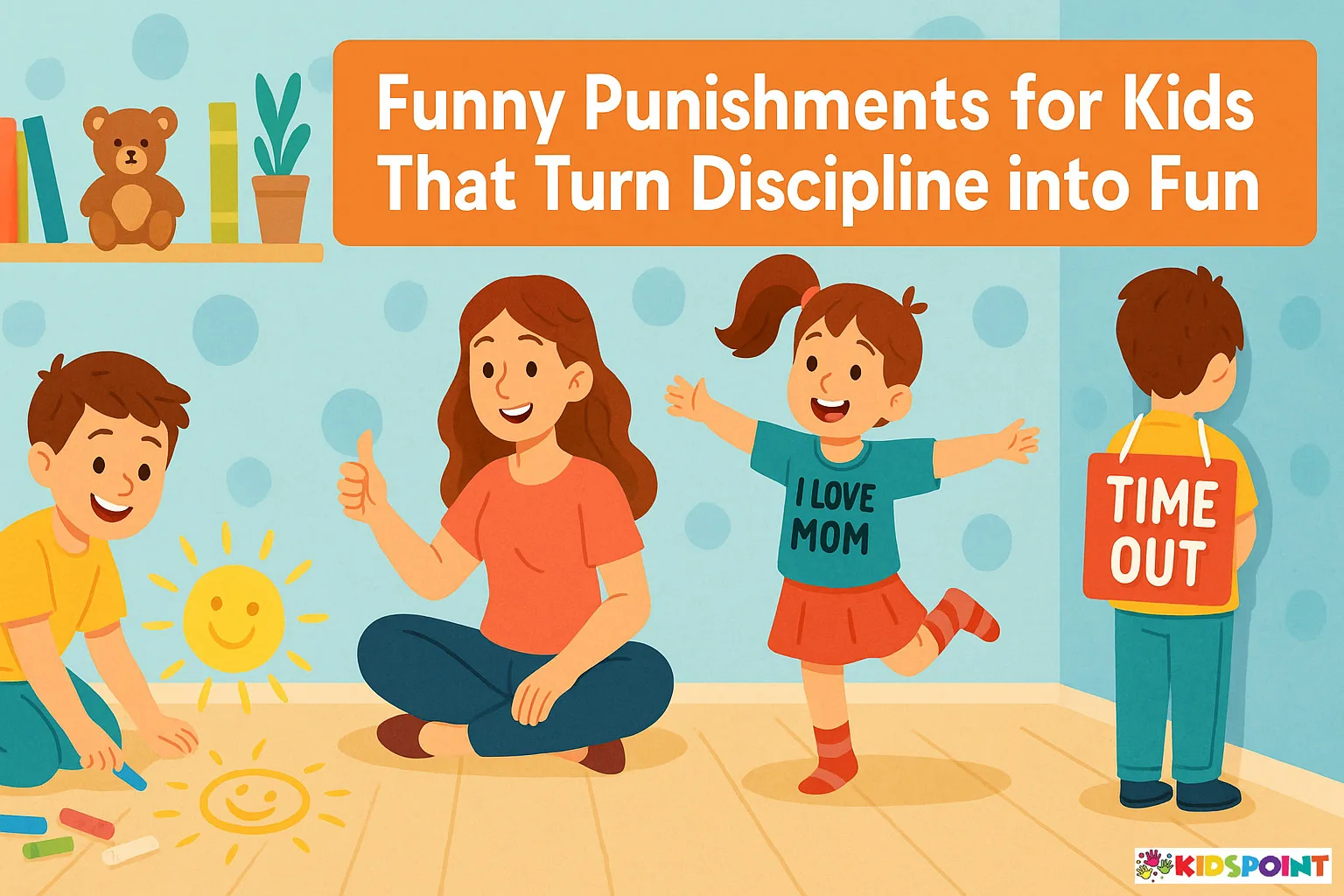Disciplining children is one of the most challenging aspects of parenting. Kids are naturally curious, energetic, and sometimes mischievous, which can lead to behavior that needs correction. Traditional punishments, however, can often make discipline feel like a dreaded experience for both parents and children. But what if discipline could be fun, creative, and still effective? At The Kids Point, we believe that learning through laughter is one of the best ways to help children understand consequences while maintaining a positive environment.
In this article, we’ll explore funny punishments for kids—safe, age-appropriate, and designed to make lessons memorable without creating fear or resentment.
Why Funny Punishments Work
Funny punishments work because they combine learning and humor, which helps children:
- Understand consequences without feeling scared or ashamed.
- Develop problem-solving skills as they navigate playful tasks.
- Enhance creativity through imaginative and engaging activities.
- Build emotional intelligence by connecting actions to outcomes in a positive way.
Children respond better when discipline feels fair, lighthearted, and constructive. Using humor in punishment can prevent power struggles, reduce stress, and maintain a strong parent-child bond.
Principles of Effective Funny Punishments
Before implementing funny punishments, keep these principles in mind:
- Keep it Safe: Ensure the activity poses no physical or emotional harm.
- Be Consistent: Follow through every time the rule is broken.
- Focus on Learning: The goal is to teach, not just entertain.
- Personalize the Punishment: Tailor it to the child’s age, interests, and temperament.
- Keep it Short and Simple: Long or complicated tasks can lead to frustration.
Top 5 Funny Punishments for Kids That Make Discipline Fun
The Silly Walk Challenge: Turn misbehavior into movement! Ask your child to walk like a funny character—think robot, penguin, or superhero—for a minute or two around the room. It helps release energy while keeping discipline lighthearted.
Sing Your Apology: Instead of a regular apology, have your child sing it in a silly tune or rhyme. This makes them reflect on their actions while turning the correction into a fun and memorable moment.
Sock Puppet Lecture: Encourage creativity by having your child make a sock puppet and use it to explain what they did wrong. Puppets allow kids to express their understanding of consequences in a playful way.
Clean-Up Dance Party: Make chores a party! When toys are left out, ask your child to clean up while dancing to their favorite song. This adds movement, fun, and responsibility all at once.
Draw the Rule: Have your child draw a comic strip or illustration showing the rule they broke and the right way to behave next time. This visual approach reinforces learning while letting kids express themselves creatively.
How to Implement Funny Punishments Successfully
To make these punishments effective, follow these tips:
Explain the Purpose: Always clarify why the behavior was inappropriate and how the punishment helps them learn.
Keep It Positive: Focus on correcting behavior, not shaming the child.
Make It Age-Appropriate: Younger children enjoy playful tasks, while older kids may appreciate creative or humorous challenges.
Be Consistent but Flexible: Use funny punishments regularly, but adapt to situations when needed.
Celebrate Improvement: Praise your child when they respond well or improve their behavior. Positive reinforcement strengthens learning.
Benefits of Funny Punishments
Using humor in discipline comes with several advantages:
Reduces Stress: Both parents and children experience less tension during corrective moments.
Encourages Cooperation: Kids are more likely to cooperate when the punishment feels playful.
Enhances Creativity: Many funny punishments involve imagination and problem-solving.
Strengthens Parent-Child Bond: Shared laughter creates positive memories and strengthens relationships.
Promotes Long-Term Learning: Children remember lessons learned in a fun, engaging way better than through fear.
Safety Considerations
While funny punishments are playful, always ensure:
- No tasks are physically harmful or unsafe.
- Emotional safety is prioritized—avoid embarrassment or ridicule.
- Tasks are short and manageable to prevent frustration.
- Age-appropriate humor is used; what’s funny for a 5-year-old might not work for a 10-year-old.
When Not to Use Funny Punishments
Funny punishments are effective for minor misbehavior and teaching lessons, but they should not replace serious interventions when:
- Behavior is dangerous or aggressive.
- A child repeatedly disrespects rules despite guidance.
- Professional support is needed (behavioral therapy, counseling).
In these cases, it’s important to combine playful discipline with clear expectations and, if necessary, professional guidance.
Funny Punishments for Different Age Groups
Toddlers (2–4 years)
- Short, imaginative tasks (e.g., silly walk or playful cleanup).
- Simple, visual reflection (drawing or pointing out mistakes).
Preschoolers (4–6 years)
- Role-play and acting out misbehavior.
- Short songs or rhymes to explain consequences.
School-Aged Kids (6–10 years)
- Creative tasks like comic strips or joke reflections.
- Slightly longer chore-related fun activities.
Preteens (10–12 years)
- Improv and storytelling challenges.
- Funny voice or character-based reflections.
FAQs About Funny Punishments for Kids
Are funny punishments effective for all kids?
Yes, especially for minor misbehavior and rule-breaking, as long as they are age-appropriate and safe.
Can humor in punishment backfire?
It can, if the child feels mocked or embarrassed. Always focus on fun, not shame.
How often should funny punishments be used?
Use them consistently for minor misbehavior, but combine with clear expectations and serious guidance for more significant issues.
Making Discipline Fun: Turning Lessons into Laughter
Discipline doesn’t have to be boring, harsh, or stressful. By using funny punishments for kids, parents can turn corrective moments into opportunities for learning, creativity, and laughter. These playful strategies teach responsibility, encourage positive behavior, and strengthen the parent-child bond.
At The Kids Point, we believe that children learn best when education, guidance, and discipline are combined with fun and positivity. By implementing age-appropriate, safe, and humorous punishments, parents can cultivate a joyful environment where kids grow into responsible, thoughtful, and happy individuals.
Remember, the goal is not just to correct behavior but to create lasting memories while teaching valuable life lessons. With a little creativity, discipline can truly be a fun and engaging experience!


